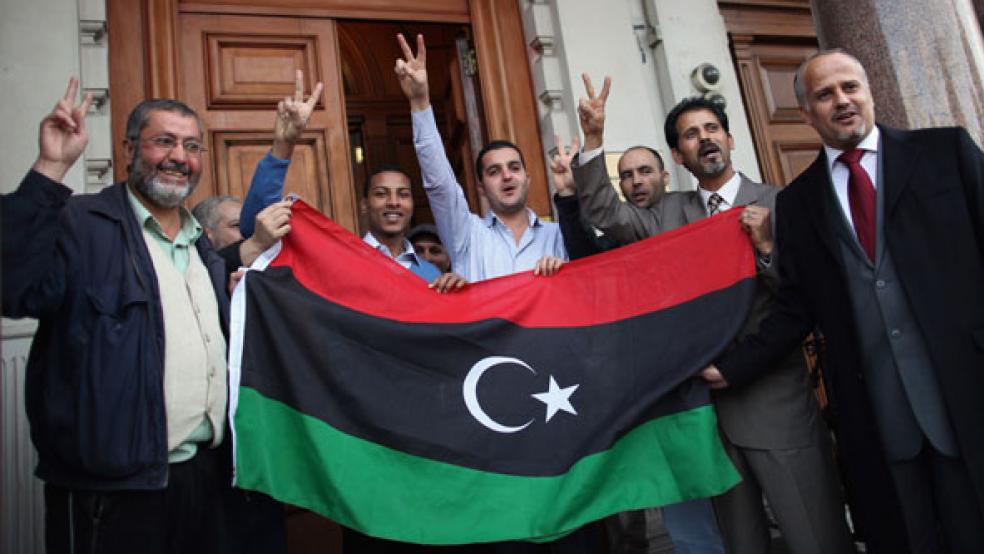President Obama rode into office on a wave of opposition to the U.S. wars in Iraq and Afghanistan, promising to pursue a more limited and strategic war on terror.
The death Thursday of Libya strongman Moammar Gadhafi, who organized the 1988 terrorist bombing that killed 270 people on Pam Am Flight 103 over Lockerbie, Scotland, adds another bullet point to a growing list of administration accomplishments vindicating that policy. From the death of Osama bin Laden at the hands of a Navy Seal team in a Pakistani safe house to the death of Gadhafi in a drainage ditch outside his hometown of Sirte, 2011 will go down in history as the year when many of the world’s most notorious terrorists were killed by U.S. or U.S.-backed forces.
Their deaths are just part of a growing list of foreign policy accomplishments for an administration that has spent most of the year in a defensive crouch because of a sputtering economy. The president has successfully managed the withdrawal of U.S. troops from Iraq, and set a course for a gradual drawdown of troops in Afghanistan. Even if 20,000 to 30,000 troops remain there after 2014, as is now projected by administration and Pentagon officials, it will save American soldiers’ lives and reduce projected government budget deficits by over $1 trillion over the next decade.
While Obama can hardly take credit for the wave of protests sweeping across the Middle East called the “Arab spring” – his administration has supported the ideal of democratic leadership in the region.
The joy and words of praise for America on the streets of Tripoli and other Libyan cities on Thursday sharply contrast with the anti-American rhetoric in the Middle East under President George W. Bush.
Republicans on Capitol Hill and on the campaign trail joined in the rejoicing over Gadhafi’s death, although some criticized Obama for not doing more to support the rebels. “It’s about time,” former Massachusetts Gov. Mitt Romney, a leading Republican candidate for president, said from the campaign trail. “The world is a better place with Qaddafi gone.”
“Today is not a day to point fingers,” said Sen. Marco Rubio, R- Fla., who in next breath did precisely that. “Let’s give credit where credit is due,” he said. “It was the French and British who led on this fight. He [Obama] did the right things, but he took too long. We...honor the service of American and NATO forces that courageously assisted in this endeavor.
Last spring, when President Obama announced limited support for the uprising by anti-Gadhafi militiamen – some of whom were motivated by tribal loyalties, some by Islamic militancy, and some by the growing movement for democracy spreading across the Middle East – he was roundly condemned by the right and the left. The Republican-led House rebuked the president for failing to seek congressional approval for using air power to aid the Libyan rebels. However, the House rejected by a 148-265 margin a resolution offered by Rep. Dennis Kucinich, D-Ohio, that called for an end to the engagement in 15 days.
Now concern turns to the shape and policies of the new government in Tripoli. “The real question, as the celebration goes on in Libya, is where do we go from here,” said Sen. Robert Menendez, D-N.J., who sponsored the “no fly zone” resolution in March that helped define U.S. support for the rebels then marching on Tripoli. “Is the transitional national council ready to move vigorously to the next stage, which hopefully can have a country that is all inclusive in its representation, and is more secular and democratic at the end of its journey.” He spoke on MSNBC.
“This thing is far from over,” said former United Nations ambassador John Bolton, a leading conservative foreign policy hawk. “We need to have a stable, hopefully pro-western successor regime.”
This is clearly a front-burner issue for the Obama administration. Secretary of State Hillary Clinton visited with the interim government in Tripoli earlier this week. “I am proud to stand here on the soil of a free Tripoli and on behalf of the American people I congratulate Libya,” she said. “This is Libya’s moment, this is Libya’s victory, the future belongs to you.”
Even as the administration celebrated the fruits of its latest foreign policy victory, Clinton, Central Intelligence Agency director David Petraeus and Joint Chiefs of Staff Gen. Martin Dempsey traveled to Islamabad to warn the Pakistani government that it had to take strong measures to stop the flow of Taliban and el-Qaeda terrorists between Afghanistan and Pakistan.
U.S. generals have pointedly blamed Pakistan’s intelligence agency for supporting the terrorists that launched recent attacks on the U.S. embassy and military installations, which killed and wounded dozens of Americans. “No one should be in any way mistaken about allowing this to continue without paying a very big price,” she said before leaving Kabul for what are expected to be a series of tense meetings in Islamabad, the New York Times reported.





